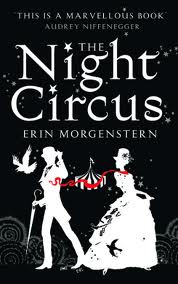 “The circus arrives without warning” – thus the first words of this magival novel – before the reader gets swept away in a miraculous world which makes everyone believe in magic. As Fontane put it, the first sentence of a novel need to comprise the whole novel, and this is what Morgenstern’s novel does – it comes without warning; it is all about illusion, and nothing is what it seems.
“The circus arrives without warning” – thus the first words of this magival novel – before the reader gets swept away in a miraculous world which makes everyone believe in magic. As Fontane put it, the first sentence of a novel need to comprise the whole novel, and this is what Morgenstern’s novel does – it comes without warning; it is all about illusion, and nothing is what it seems.
In the arena of a circus, two magicians are fighting a duel by means of their protegés Marco and Celia. They each represent two different schools of magic. In the end, none of them wins, as Marco and Celia fall in love and end the combat in their own way.
But this novel is so much more. What sounds like a compelling thriller when reading the blurb is all about illusion. Morgenstern plays with the reader’s imagination. What looks like unimportant cameos turn out to be important characters. What looks like illusion dressed like magic is magic dressed like illusion. Many criticisms attacked the fact that the characters appeared rather flat and lifeless – but I reckon that this as well is part of the illusionist game Morgenstern plays with us. Since we do not get to know any of the characters well enough, we do not know who to trust – an intelligent play with our imagination. The thing is, this novel is written in such a mind-blowing way that you cannot put it down. You feel like you can touch the tents of the circus, you can smell the waft of caramel apples in the air, and the heat of the bonfire on your face.
This book is well worth reading, be it just for the astonishing prose. Underneath it, however, there is much more which could have given way to interpretations or the quest for the meaning, but it has not been used to its full potential. There is the theme of dualism (black vs. white, public vs. secret, physical illusion vs. mental illusion, academic vs. practical education) which is prominent throughout the novel, but unfortunately not elaborated like in a masterpiece of literature. Then, there is the theme of children (the protegés) suffering for their parents vanity. There is also the theme of two conflicting philosophy or doctrines battling each other, with none of them ending up superior. There is a lot of potential for an interpretation going deeper than remaing with the prose. This could have ended up a groundbreaking, life-changing piece of art, about dualism, generation conflicts (just think of Bailey and his decision to abandon his life in favour of the circus), conflicting doctrines. Unfortunately, when it comes to the actual meaning or message, Morgenstern’s novel remains vague. Despite its potential for more meaningful interpretations, it remains all about imaginative style and descriptions, rather than making a point or focusing on the characters’ developments.
This is fair enough, but with a bit of elaboration, Morgenstern could have made this a bigger work of art. I felt the novel had a few loose ends. What was the point of the Burgess sister or Tante Padva? Why did the characters not age? It did not add anything to the novel, so could have been left out in favour of a more pronounced elaboration of a message, be it generation conflicts, the life choices we make, that every individual needs a complimentary one etc.
Anyways, considering that it is Morgenstern’s first novel, and that she is pretty young, this is definitely impressive, unique and – ya, magical. And magic makes up for many things.